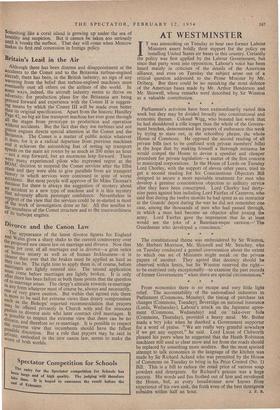bivorce and the Canon Law
The appearance of the latest divorce figures for England the Wales gives a sharp shake to the current controversy over °le proposed new canon law on marriage and divorce. Now that seven per cent, of all marriages end in divorce—a grim index of human misery as well as of human fecklessness—it is Clearer than ever that the brakes must be applied as hard as they can be. The right time to apply them is, of course, before Marriages are lightly entered into. The second application must Come before marriages are lightly broken. It is only after there has been failure at both these points that the question 9f re-marriage arises. The clergy's attitude towards re-marriage 41 any form whatever must of course be, always and necessarily, One of very grave caution. But within that agreed rule there is more to be said for extreme views than dreary compromises Such as the Bishops' reported recommendation that prayers may be offered privately in Church with and for innocent parties to divorce suits who later contract civil marriages. It Al's, Possible to respect the extreme view that there can be no ,Tvorce, and therefore no re-marriage. It is possible to respect Itioe extreme view that incumbents should have the fullest Piles s discretion. But a rule that prayers may be said in Private embodied in the new canon law, seems to make the of both worlds.


































 Previous page
Previous page